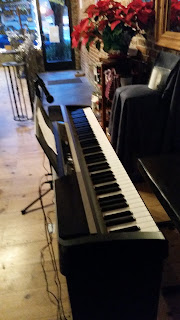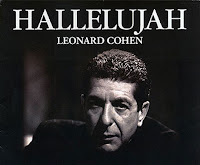 |
| The Scarlet 2i2 dual-channel Interface |
I must admit I felt some trepidation about this at first, but it definitely paid off in the end -- my approach to begin the August In Bloom project (the piano album I plan to release in the near future) involved me just "going ahead" and rehearsing the ten very difficult songs I plan to put on the album, and then figuring out the recording logistics "somewhere along the way". It's like the "shoot first, ask questions later" philosophy, except safer, and it has nothing to do with guns.
Now, to get really technical, I'm going to summarize a description of my recording equipment by listing two important devices that I have in my studio: 1) The ProTools computer software, and 2) That one recording multi-do-hickey thingamabobber.
If I wanted to bore you even more, I could get into more detail, like the fact that the ProTools system requires the use of that Interface gadget thing, which is an M-AUDIO something or another, and that I recently replaced that with a spiffier one that will make the recording sound way cooler (you can see a picture of this above). It's a really good thing I wasn't an engineer aboard the NASA space shuttle. I'd be telling people to "unhook the thingmajig and ignite that one funnel-looking thing with the small-ish hose, then clamp that attachment thingy to the belt or whatever," and then the mass explosion would be entirely my fault. But, believe it or not, this process of figuring out how to make a good sound on a CD has been on-going and brought my bank account down a few notches (okay, a LOT of notches), but the exciting thing is that I'm finally getting the make-a-CD-with-awesome-sound-quality thing to work!
This process took quite a few "baby steps" and it involved a lot of research. In the mean time I've been practicing the actual songs on the Yamaha N2 hybrid. Sometimes the "shoot first and ask questions later" (or, more accurately, "practice first and figure-out-the-recording-thing later") is a great strategy, because it's efficient time-wise. Now, for anyone out there who claims that the sound quality isn't really that important...
"Sound quality doesn't matter"? I'm going to pretend I didn't hear that...
I like to think that I'm not an "eye-roller." When I think of people who roll their eyes, I mainly think of the ornery teenagers I sometimes see when I occasionally partake in my job as a substitute teacher. But there's one thing that will make my eyes roll back far enough to pretty much go full-circle, and that's when I find a piano that's out of tune and people tell me, "Oh, come on, no one will even notice."
As if a blog post is going to reach out to the population of people that induce this eye-rolling response in me, I'm going to set the record straight: You do notice the difference. You might not think you do, but you do. Yes, you, the you that's reading this, the you that's maybe not "trained" to hear music, the you that "doesn't know the difference" between a tuned piano and an untuned piano. When I play on an out-of-tune piano (i.e., most pianos), I often get this reaction from people: "Nice! Sounds like you need to practice a little bit, though". They don't realize that the constructive feedback in the second part of that response is often a result of the piano being crappy and not necessarily because of poor piano-playing. Interestingly, when I play the exact same piece, or the exact same melody, on a tuned piano, I get this reaction: "Wow! That sounded really good. Sounds like you've been practicing!"
Again, keep in mind that I've encountered these two reactions when playing the same thing on two different pianos, one out-of-tune one and another in-tune one. It's not always the skill level or ingenuity of the composition that people love so much about some piano music, but it's also just the fact that an expensive, quality piano that's maintained and is in tune just sounds amazing. So I generally make it a rule that I don't play on pianos that are out of tune; it doesn't do the music any justice. Would you listen to a guitarist if he were playing on a guitar that was obviously out of tune? And if so, don't you think the quality of the song would be significantly less than if it were in tune? The piano is no different.
My point in bringing this up is that the same is true for recording quality, when it comes to CD's, albums, mp3 files, etc. Many people will notice that I'm being quite patient about any amount of time I need to take before releasing August In Bloom, just to make sure I can get the most optimal sound quality possible. Oddly, I don't hear many people (or anyone, really) disagree with me when I say that sound quality is important when it comes to releasing a CD, but a bunch of people will tell me "no one will notice" if I play an out-of-tune piano at a concert.
Bottom line: you, yes you, do notice when a CD has poor sound quality. And you, yes you, do notice when a piano is out of tune. You might just think the pianist is playing poorly, when, again, it's often just the piano that sounds bad. Look up a famous piano song (like a famous classical piece) on YouTube, and you'll see that the performer using an in-tune piano, with good sound quality, will have tens of thousands of hits, whereas the "homemade quality" video of the kid playing on an out-of-tune piano will only have 20 or so hits. There's a reason.
The Plan
And now to the fun part: the plan for recording the album! There are ten songs, each played on the Yamaha AvantGrande N2 in my office/studio, and the songs will be recorded as WAV files using a TASCAM multi-track recorder. I may use some of the songs (or all of them) as one track, and copy the WAV files directly to a CD. I might also upload these tracks onto my ProTools editing software, if I want to edit the songs (or add other tracks, such as strings, percussion, etc.). Then I'll be recording these songs onto ProTools directly, using a Scarlet 2i2 interface device that I just recently ordered. The two recordings of the songs will be compared with each other, the best-sounding one obviously being selected, and the ten WAV files will be given to a sound engineer I plan to hire to clean up the tracks. Then the CD will be submitted to a company for manufacturing, and/or to CDBaby. End result: the CD will be available for purchase from my site, as well as from CDBaby, iTunes, Amazon, and from myself directly. The individual songs will also be for sale (99 cents each) from my site, just as I have done with the tracks from Heart of Storms. As one can imagine, this entire process keeps taking longer than I anticipate, which is why I've changed my "release date" from January 1st, 2017 to, you know, "January-ish". Maybe after my 3rd, 4th, 5th. etc. album I'll get a better idea of how long this stuff takes and be able to better estimate a date when these processes are completed.
Planting the Seeds for a Tour
 |
| Playing at Wine Time (restaurant in Chico, CA) |
As some may already know, my intention is ultimately to travel to different areas and perform. This, of course, is every musician's dream, and a host of obstacles come up that prevents them from doing so (it costs too much money, they fall in love, they get married, they have kids, they get swallowed up by day jobs to pay their bills, or they simply convince themselves that it can't be done, etc.). The release of this coming album is intended to be a launch-pad into possible concerts and shows, even if they are simple, such as "house concerts" or small benefits and/or shows dedicated to various causes. My next step after the album's release, in addition to the release of additional albums as well as a host of other things that have mainly existed as only ideas so far (including the publication of a novella to be associated with a "trilogy album", which you can read about in a blog post from January of this year, called "Why Music Is Incomplete Without a Background Story") is to start scouting out venues for a possible tour. Traveling is fun, anyway, and I'm curious as to the kinds of experiences I may have and the people I may meet along the way. This is also why I'm putting in the kind of money that I have been putting in and being as careful as I am about the sound quality of August In Bloom. There's a lot of people populating this planet, and a lot of competition in this industry, so I have to be picky. That being said, it's back to work :D






































